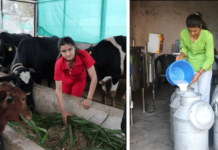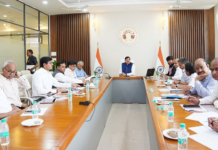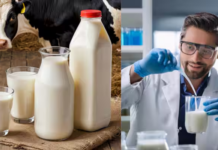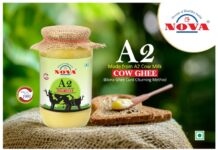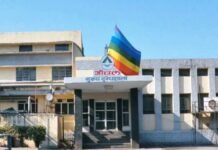New Delhi, June 16, 2022: Over a hundred dairy farmers from Chikkaballapura district of Karnataka on Wednesday arrived at Freedom Park in Bengaluru, demanding a higher procurement price for milk.
The farmers are paid Rs 26-Rs 28/ltr for milk; however, they demand the procurement price be hiked to Rs 50/ltr. The farmers are in distress owing to the high cost of cattle feed as well as essential commodities. Small farmers have stables comprising two to four cows and cannot depend on the produce for subsistence.
The protesting farmers were organised by the Karnataka Haalu Uthpadakara Vedike (Forum for Milk Producers in Karnataka). The state president of the organisation, MR Narayanagowda, alleged that several thousand farmers were to arrive for the protest. He said, “Today morning, the KMF (Karnataka Cooperative Milk Producers’ Federation Limited) unions stopped 25 vehicles (of farmers) at Kolar and made false promises to them and sent them back home. This is because Rs 14 lakhs worth of ghee was misappropriated at the Kolar union three months back. They tried to pass it off as theft. At least 120 crores of misappropriations have occurred at Kolar and Chikkaballapur unions. Since we are trying to expose them, they are now threatening the farmers that their milk will not be purchased if they participate in the protests.”
The farmers sell their produce to KMF. At the village level, cooperative dairy societies purchase milk from the farmers at Rs 26 to Rs 28/ltr and provide them with a bill with the details of purchase. The payments are made directly into their bank accounts every 15 days. The milk is then transported to any of the 14 milk unions present at the district level. The final products are sold at retail for Rs 38 to Rs 45/ltr depending on the type of milk. The Government of Karnataka also provides incentives to the farmers at Rs 5/ltr (of milk sold to KMF). This payment arrives in a lump sum twice a year. Moreover, if the farmer does not link his Aadhaar card to his bank account, the incentives are not paid at all. However, the protestors argue that if the procurement price was hiked to Rs 50/ltr, the incentives could be discontinued.
The farmers say that a jersey cow can produce around 8-10 litres of milk/day, depending on the feed given. The feed includes busa (wheat bran), hindi (oil cake), and fodder. The cows are fed at least 2kg each of busa, hindi and fodder twice a day. The amount of feed may vary based on the size of the cow according to the reports published in newsclick.in.
The price of busa is Rs 35/kg, hindi is Rs 50/kg, and a 50 kg bag of fodder is sold at Rs 1,200.
A farmer with two healthy and productive jersey cows may earn Rs 400-500/day. However, he will also incur a cost of Rs 200-250/day.
Rafique, 62, arrived at Freedom Park from Hirebidanur village in Chikkaballapura district. He is a dairy farmer with four cows in his stable. He said to NewsClick, “I need to provide 8 kgs of feed daily for each cow. In return, I get 60 ltrs of milk/day. The cost of the feed keeps going up, but my earnings are getting smaller.”
His words are echoed by Ashwath Narayana, 40, from Idagur village. He has a stable of 2 cows which earns him around Rs 6000/month. “Half of my earnings are gone in the feed. I cannot live depended on just my cows. I have to work as a labourer in order to feed my family.”
YH Gopalkrishna, Additional Registrar of Cooperative Societies, turned up at the location to listen to the appeal of the farmers.
Narayanagowda said, “The 14 milk unions are not efficiently managed. I believe that IAS/KAS officers should be appointed as Managing Directors of the unions so that experienced administrators can take over. If this government is really pro-farmer, it will raise the procurement price of milk and ensure the survival of dairy farmers.”




